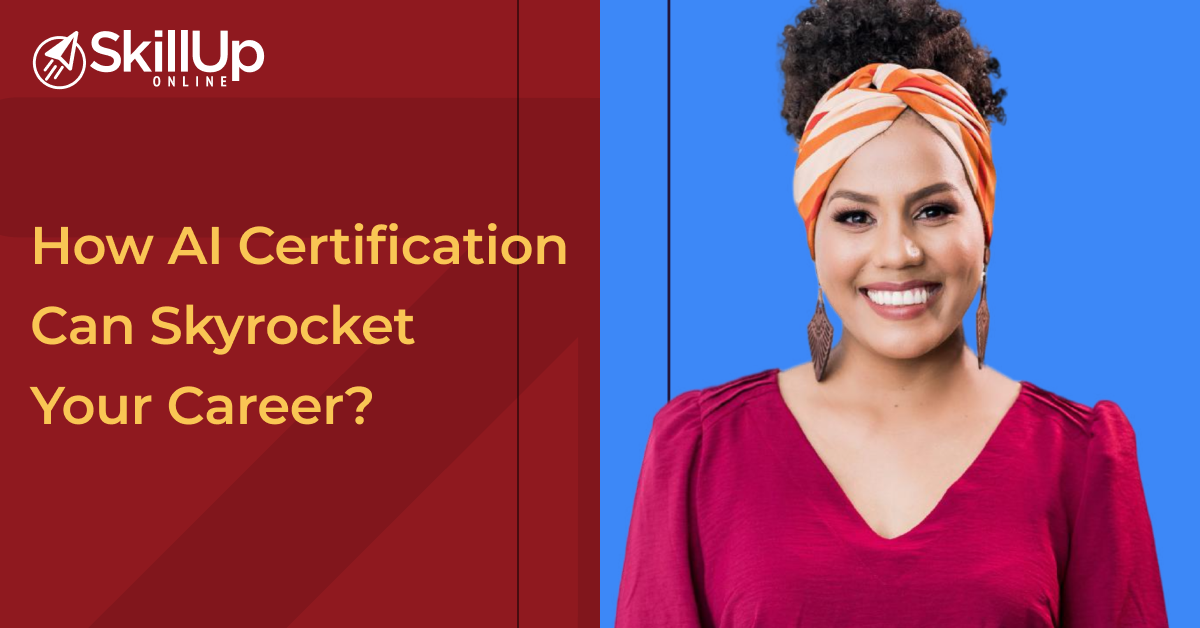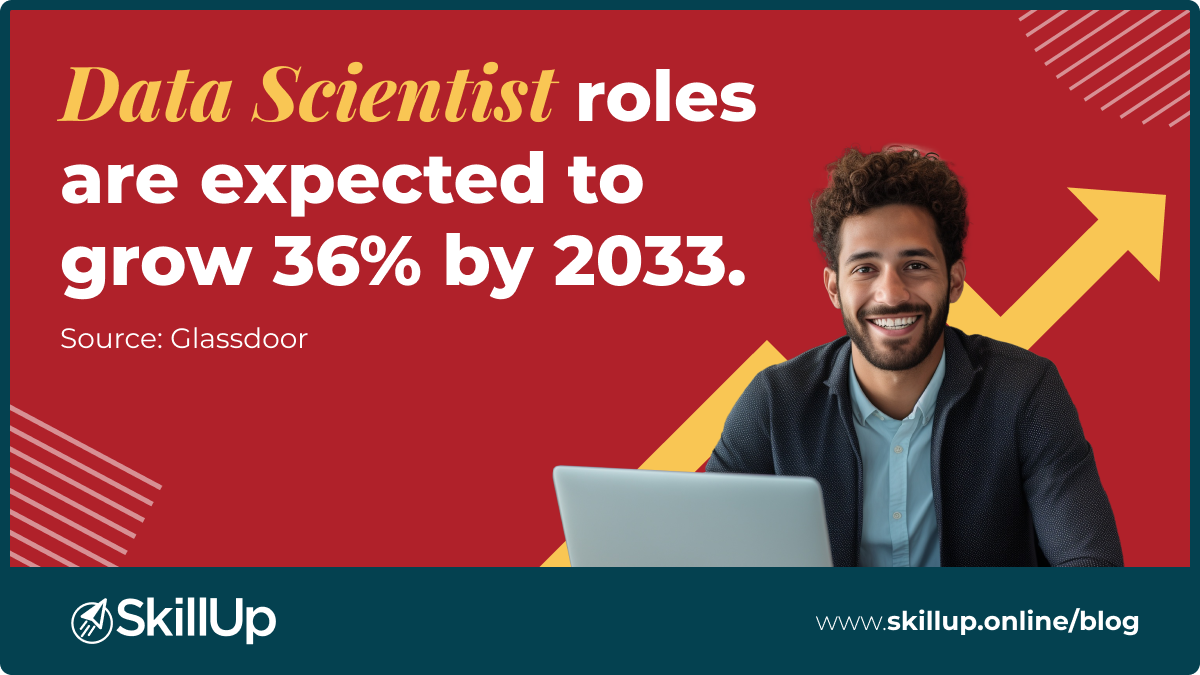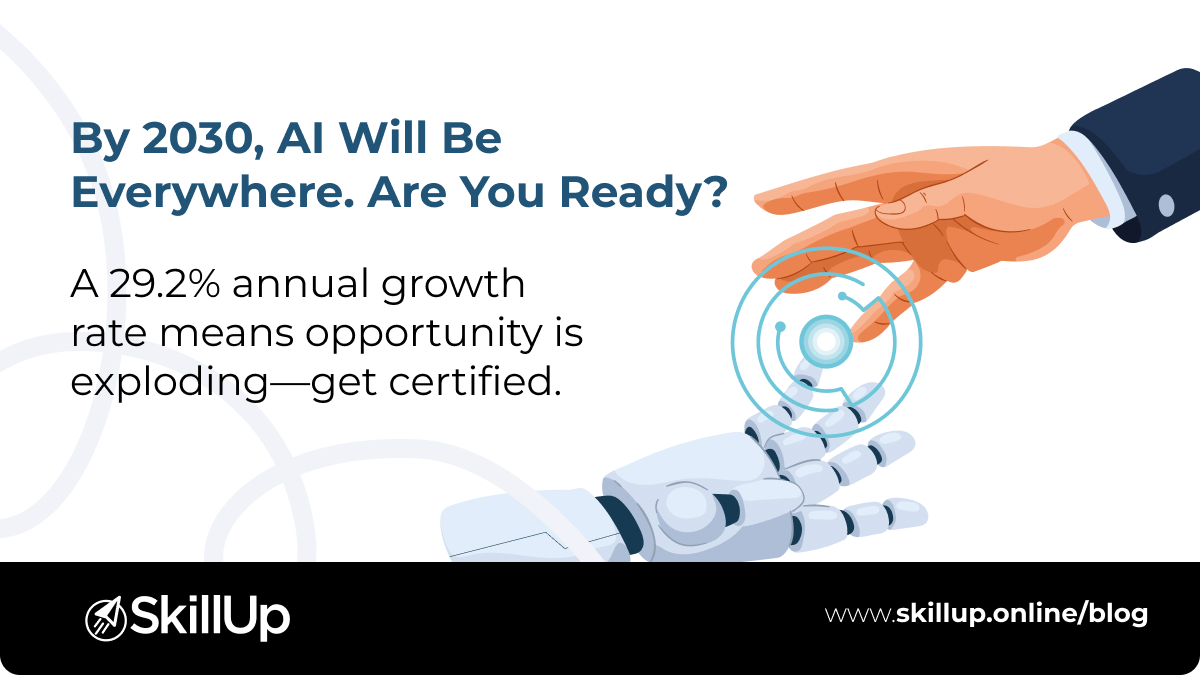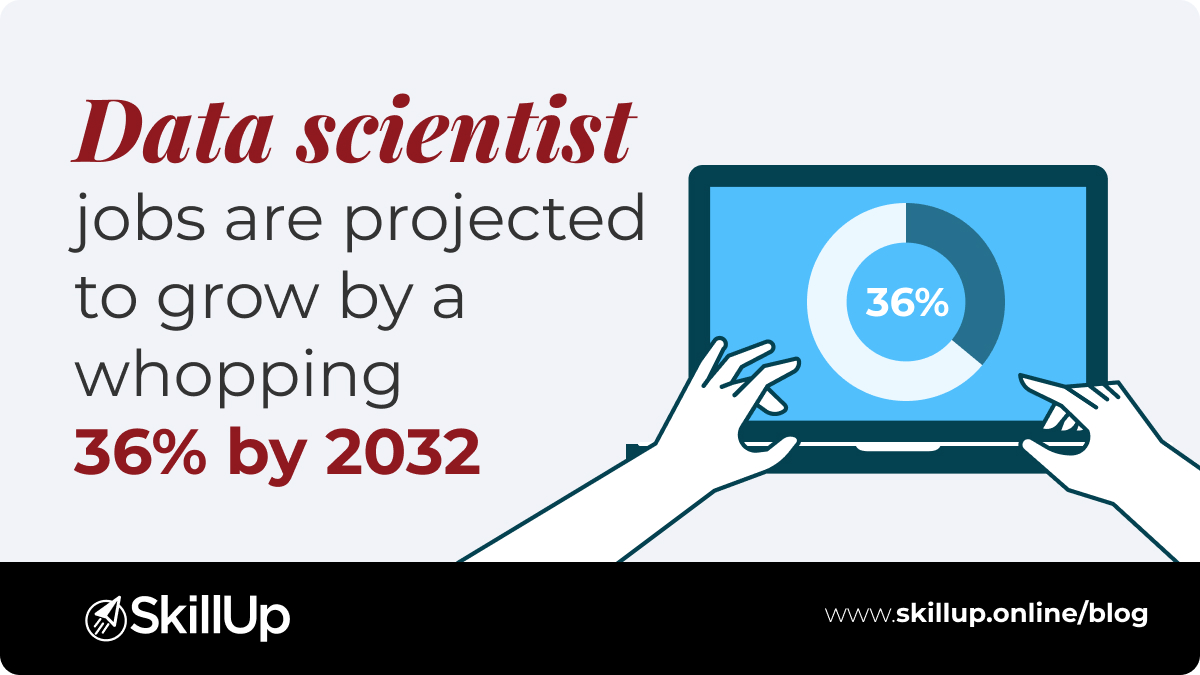Artificial intelligence (AI) is no longer the future; it’s the present. In the U.S., AI has been a transformative force across various sectors, from healthcare to finance and even public policy. According to a McKinsey report, AI could add up to $13 trillion to the global economy by 2030, with the U.S. being a significant contributor.
Why does this matter to you? Simply put, the demand for AI specialists is surging, and it is expected to be one of the top 10 career paths for the next decade. So, it’s certainly a career that anyone with a tech mind should at least consider!
How AI Certification Becomes a Career Catalyst
Getting certified in AI isn’t just another line on your resume; it’s a powerful catalyst for career growth. By earning an AI certification, you’re moving proactively to stand out in the competitive U.S. job market and show employers that you’re committed to lifelong learning and excellence.
The U.S. Job Landscape: Why AI Matters
Current Demand for AI Specialists in the U.S.
If you’ve ever doubted the relevance of AI, the numbers speak volumes. As of 2023, there were nearly 50,000 job openings in AI across various industries in the United States. This demand underscores the urgency to fill roles from data scientists to machine learning engineers. In particular, sectors like healthcare, finance, and automotive are clamoring for talent, making it a ripe time for AI-certified professionals to enter the field.
Regional Hotspots: Where the Jobs Are
When it comes to AI jobs, location can be a game-changer. Thanks to a concentration of tech companies and research institutions, cities such as San Francisco, New York, and Boston are already hubs for AI development. However, you shouldn’t discount emerging tech cities like Austin and Denver, which also show significant growth in AI job opportunities. All of these hotspots offer career advancement and a thriving community to be part of.
Future Projections: Stability and Growth
What’s reassuring about a career in AI is its long-term stability. According to the U.S. Bureau of Labor Statistics, job roles related to AI and machine learning are expected to grow by 16% through 2028. This projection reflects stability and room for career advancement and specialization.
Understanding the U.S. job landscape for AI specialists is pivotal for planning your career. By recognizing where the demand is, which locations offer the most opportunities, and how the field is poised for growth, you’re already a step closer to making an informed decision about AI certification.
Skills Gained Through Certification
Acquiring new skills and knowledge is an essential aspect of personal and professional growth. One powerful avenue for skill development is through certification programs. These programs are designed to provide you with specialized training and expertise in a particular field, and equip you with the tools and competencies you need to excel in your chosen career. Here are examples of the important tech skills that you can gain from an AI certification:
Must-know Algorithms for AI Jobs
Understanding the right algorithms can set you apart when landing a coveted AI role in the U.S. For instance, an understanding of machine learning algorithms like random forests, decision trees, and neural networks is often listed as a prerequisite in job descriptions. A certification program that equips you with hands-on experience in these algorithms is not just an asset; it’s almost a necessity in today’s competitive job market.
Navigating Data Privacy and Ethics: Regulations
Data is the lifeblood of AI, but how you handle that data matters immensely. In the U.S., understanding regulations like the California Consumer Privacy Act (CCPA) and the Health Insurance Portability and Accountability Act (HIPAA) is crucial. An AI certification often includes modules that guide you through these complex regulations, ensuring you’re technically competent and ethically responsible.
Mastering Soft Skills: Communication and Problem-Solving
While algorithms and data privacy are pivotal, soft skills are your hidden weapon. Being able to articulate complex AI concepts in simple terms or working effectively in a team environment can make you an invaluable asset. AI certifications usually encompass training that hone these skills, preparing you for the multifaceted challenges of the AI world.
Note that these skills are just three examples you gain from an AI certification and there’s much more to explore. AI certifications will not only equip you with these but will also make you job-ready.
Financial Returns: Salary and Benefits
If you’re considering a career shift into AI, it’s natural to be curious about the financial benefits. In the U.S., the median salary for a machine learning engineer is around $146,085, while data scientists can expect an average of $96,195 per year. These figures can vary depending on your experience, location, and the company you work for, but one thing is clear: AI professionals work in a lucrative field.
Stock Options, Bonuses, and Other Perks
In addition to a robust base salary, many AI positions come with added financial incentives. These can range from stock options in the company to performance bonuses. It’s common for AI professionals to have the opportunity to significantly boost their income through these additional benefits, making the field even more attractive for career growth.
Healthcare and Retirement Benefits in the U.S.
Regarding benefits, the U.S. job market often includes comprehensive healthcare plans and retirement options like 401(k) matching. Companies in the AI sector are no exception. These benefits are not just ‘nice-to-haves’; they’re crucial for long-term financial planning and can add substantial value to your overall compensation package.
With a solid salary base, additional financial perks, and long-term benefits, a career in AI promises professional growth, financial stability and security.
Career Trajectories in the U.S. Unlocked by AI Certification
Entry-Level to Mid-Level: Climbing the Ladder
Starting as a data analyst or junior data scientist, an AI certification can give you the edge you need to progress swiftly. Your next step could be a role as a machine learning engineer or an AI specialist, roles that often require a deep understanding of algorithms and data manipulation. These mid-level positions offer higher compensation and open doors to roles involving increased responsibilities and skill sets.
Advanced Roles: Leading Projects and Teams
Once you have sufficient experience and a machine learning engineer or AI specialist title on your resume, you may be ready for advanced roles. Certification in specialized AI domains, like natural language processing or computer vision, can set you up for job titles like AI project manager, AI architect, or even chief data officer. These positions often demand expertise in AI technology, team management, and strategic planning.
Entrepreneurship: Start-ups and Consultancies in the U.S.
If the conventional career path isn’t for you, AI certification offers a robust grounding for entrepreneurship. Whether you’re looking to start your own AI consulting firm or develop a game-changing product, the skills you acquire through certification can be invaluable. It provides you with both the technical depth and the industry overview necessary to identify gaps in the market and build effective solutions.
How to Ace Career Milestones
Building a Compelling Resume
In the U.S., recruiters prefer resumes that are crisp yet comprehensive. Apart from detailing your education and work experience, you should also highlight any AI certifications, as this showcases your commitment to skill development. Additionally, tailor your resume for AI roles by focusing on quantifiable achievements that demonstrate your technical aptitude and problem-solving abilities.
Networking Effectively: LinkedIn and U.S. Conferences
Building a strong network is crucial for career growth in any field, including AI. Use LinkedIn to connect with industry experts, join AI-focused groups, and participate in discussions. Virtual and in-person conferences offer valuable opportunities to meet thought leaders in the AI space. Events like NeurIPS and the AI Expo are great platforms for networking and keeping up-to-date with industry trends.
Preparing for Interviews: Typical U.S. Interview Questions
While technical interviews for AI roles in the U.S. focus on your knowledge of algorithms and data structures, behavioral interviews gauge your soft skills and cultural fit. Be prepared to answer questions like, “Can you discuss a project where you had to implement an AI solution?” or “How do you approach ethical considerations in AI?” Familiarize yourself with technical and behavioral questions to ensure a well-rounded interview performance.
Overcoming Barriers to Career Advancement
Upskilling: Navigating the U.S. Education System
Staying relevant in the AI field means continual learning. While certification can kickstart your career, you’ll need to adapt to new technologies and methodologies as you go along. In the U.S., numerous online courses, workshops, and boot camps are available to help you upskill.
Overcoming Cultural and Gender Barriers
Diversity, including the AI industry, is an ongoing challenge in the tech world. While companies in the U.S. are increasingly focusing on inclusive hiring practices, the path isn’t always smooth. Seek mentorship from professionals who have navigated these challenges and join diversity-focused networks like AI4ALL and Women in Machine Learning to tap into additional support and opportunities.
Juggling Education, Work, and Personal Life
The rapid pace of the AI industry can make it challenging to find a balance between work, further education, and your personal life. Time management and prioritization are crucial. Whether setting aside dedicated “learning hours” each week or using project management tools to track your commitments, planning is your best ally.
Visa and Work Authorization
If you’re a non-U.S. citizen, navigating the visa process can be challenging. Commonly used visas for AI specialists are the H-1B for specialty occupations and the O-1 visa for individuals with extraordinary abilities in their field. Ensure you consult an immigration attorney to determine the best path for you.
Finding Remote vs. In-person Roles
The COVID-19 pandemic has accelerated the acceptance of remote work, including in the AI sector. Remote roles offer location flexibility but may require irregular hours to accommodate global teams. On the other hand, in-person roles often provide better networking opportunities and can be advantageous in collaborative, team-based projects.
AI Certifications and U.S. Accreditation
In the U.S., AI certifications from well-known educational institutions or industry-recognized bodies carry significant weight. Some top players include SkillUp Online, who has partnerships with IT giants like IBM, Google, and Microsoft that offer you several AI-based certifications. A great example is the TechMaster Certificate Program in Data Science and AI and the IBM Applied AI Professional Certificate. However, not all certifications are created equal, so choose a program that aligns with your career goals and has solid industry recognition.
By addressing these key concerns, you’re already a step closer to making an informed decision about your career trajectory in the U.S. AI industry.
Continued Learning
Also, bear in mind your learning shouldn’t stop at certification. Platforms like SkillUp Online offer cutting-edge courses that update you on industry trends. Webinars, workshops, and industry conferences also provide invaluable insights.
Next Steps: Your Career Action Plan
Success in the AI industry starts with meticulous planning. Here’s a list to guide you:
- Choose Your Specialization: Decide whether you want to focus on machine learning, data science, natural language processing, etc.
- Select a Reputable Certification Program: Ensure the program is well-recognized and aligns with your career goals.
- Set a Study Schedule: Aim for consistent daily or weekly study hours.
- Practice, Practice, Practice: Use sandbox environments and real-world datasets to gain hands-on experience.
Follow the above and put into practice the recommendations, and you’ll be able to leverage your AI certification for a promising and fulfilling career.
If you would like to know more about how you can build the necessary AI skills to get started, contact our Learner Support Team at [email protected]. They will be more than happy to guide you on your next steps.
SkillUp Online







